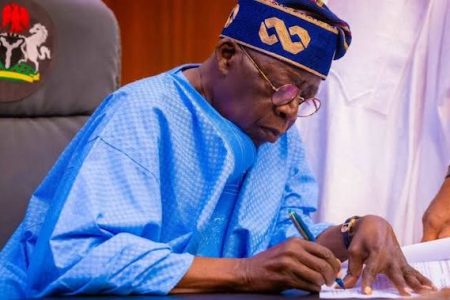Reinstating the Old National Anthem: A Misplaced Priority in a Time of Urgent Needs
By Matthew Eloyi
In a surprising and swift legislative move, President Bola Tinubu has signed the National Anthem Bill 2024 into law, reinstating Nigeria’s old anthem, “Nigeria, We Hail Thee,” in place of the currently recognised “Arise O Compatriots.” This decision has sparked a wave of criticism across the country, with many Nigerians questioning the urgency and necessity of such a change amidst more pressing national issues.
The bill, which sailed through both the Senate and the House of Representatives with remarkable speed, seems to have prioritized a symbolic gesture over the tangible needs of the nation. At a time when Nigeria is grappling with economic instability, security challenges, and critical infrastructure deficits, the focus on changing the national anthem appears to many as a glaring example of misplaced priorities.
Critics argue that this legislative effort does little to address the pressing concerns of ordinary Nigerians. The nation’s healthcare system is in dire need of reform, educational institutions are underfunded, and the ongoing security threats continue to endanger lives and property. In light of these challenges, the decision to revert to an old anthem feels disconnected from the immediate needs and aspirations of the people.
Moreover, the current anthem, “Arise O Compatriots,” has become deeply ingrained in the national consciousness since it was adopted in 1978. It has been a unifying call to action, encouraging Nigerians to serve with heart and might, and to uphold the nation’s honor and glory. Reverting to “Nigeria, We Hail Thee” may evoke nostalgia for some, but it risks alienating a younger generation that has grown up with the current anthem as a symbol of national pride and identity.
Public reactions to the bill’s passage have been mixed, with social media platforms buzzing with debates and discussions. Many Nigerians are expressing their dissatisfaction, pointing out that the anthem change does not reflect the country’s current realities and struggles. They question the logic of investing time and resources into altering a national symbol when there are more immediate and impactful ways to demonstrate leadership and commitment to national progress.
In a democracy, the voices of the people are paramount, and it is essential for leadership to align its actions with the needs and desires of its citizens. The swift passage of the National Anthem Bill 2024, while legally sound, may be seen as a missed opportunity to address more critical issues that require urgent attention. It is a reminder that symbols, while important, should not overshadow the substantive work needed to improve the lives of Nigerians.
As Nigeria moves forward, it is crucial for the government to reassess its priorities and focus on policies and initiatives that will bring about meaningful change. The nation’s anthem, whether old or new, should serve as a reflection of a country striving to meet the needs of its people, fostering unity and progress in every stanza.
